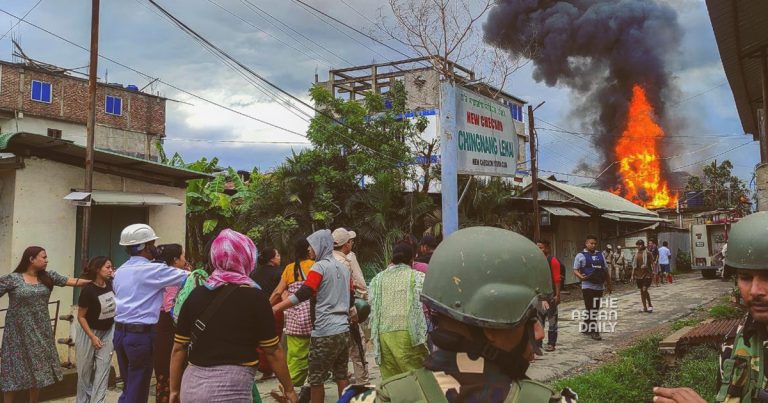7-8-2023 (NEW DELHI) The ongoing unrest in Myanmar since the coup in 2021 has had profound implications for the neighbouring state of Manipur in northeastern India. The region has witnessed a surge in illegal migration from Myanmar, exacerbating concerns and fueling ethnic conflicts. The majority Meitei and minority Kuki communities in Manipur have been engaged in clashes since early May, resulting in a death toll of over 150 individuals.
While the immediate trigger for the violence was a proposed affirmative action policy favoring the Meiteis, the underlying tensions revolve around demographic changes and the fear among Meiteis of losing their majority status and influence in Manipur due to what they perceive as “large-scale illegal migration” from Myanmar.
Accusations have been made by Meitei groups against the Kukis, who share ethnic ties with the Chin people across the border, alleging that they are illegally settling Myanmar refugees in the hilly regions of Manipur. The rhetoric surrounding the issue has been inflammatory, with a representative from a prominent Meitei organization claiming that a majority of Kukis are illegal migrants.
The Meitei community, comprising slightly over half of Manipur’s population of 3.2 million, is primarily concentrated in the valley districts, occupying around 10 percent of the state’s area. The remaining population, mainly belonging to the Kuki and Naga tribes, resides in the hilly terrain that covers 90 percent of Manipur.
N. Biren Singh, Chief Minister of Manipur and a leader of the Bharatiya Janata Party, has attributed the ongoing violence to illegal migrants and drug traffickers from Myanmar, alleging that these forces seek to destabilize the state. The state’s morgues currently hold 118 unclaimed bodies, with India’s Solicitor-General Tushar Mehta stating that they belong to “infiltrators who came with a particular design and got killed.”
In response to concerns over illegal migration, the authorities in Manipur have initiated the collection of biometric details of Myanmar nationals residing in the state. This measure aims to determine their numbers and monitor their activities. Recent clashes in Khampat, western Myanmar, have led to an influx of 718 Myanmar nationals into Manipur between July 22 and July 23.
The India-Myanmar border, spanning 1,643 km, operates under a free movement regime, allowing tribes residing on both sides to travel up to 16 km across the boundary for a maximum of three days without visa restrictions. Although this regime was suspended in 2021, it has failed to stem the influx of Myanmar nationals into India.
Estimating the number of illegal Myanmar migrants in Manipur has proven challenging due to a lack of accurate data. Civil society organizations speculate that the figure could range between 15,000 and 20,000. However, Kuki groups dismiss the Meitei narrative of “large-scale illegal immigration” as a broad generalization that unfairly tarnishes the entire Kuki community and exacerbates tensions.
Thangminlen Kipgen, spokesperson for Kuki Inpi, an organization representing the interests of the Kuki community, welcomed the efforts to track illegal migrants in Manipur. He called for the truth to be revealed regarding illegal migrants across all community lines to dispel false narratives and enable appropriate action.
While acknowledging the importance of providing temporary identity documents and humanitarian support to refugees fleeing persecution in Myanmar, Babloo Loitongbam, director of Human Rights Alert based in Manipur’s capital, Imphal, emphasized the need to address concerns surrounding ongoing illegal migration and its impact on demographics. He highlighted the risks associated with an unregulated border and stressed the necessity of establishing a population commission to formulate effective recommendations.
The ongoing conflict has also shed light on the rampant cultivation of poppy in Manipur’s hills, particularly by Kuki communities under the influence of local militant groups. This trade connects to the wider opium economy of the “Golden Triangle” region in Southeast Asia, which includes Myanmar. Meitei protests against “Chin-Kuki narco-terrorism” have drawn attention to the issue. While the Manipur government launched a “war on drugs” in 2018 to eradicate poppy cultivation, Kukis argue that it has unfairly targeted their community, as they have turned to poppy cultivation due to a lack of alternative viable opportunities.
Kipgen blamed the state government for encouraging poppy cultivation in the hills, citing the failure to provide necessary support and infrastructure for non-poppy farming. The absence of food processing centers, transport subsidies, and cold storage facilities has made traditional vegetable farming economically unviable. Consequently, Kukis, Nagas, and Nepalis in the hilly areas have resorted to cultivating poppy, which has become a crucial source of income to support education and livelihoods.
Loitongbam cautioned against attributing blame solely to one ethnic group or the farmers involved in the drug trade, emphasizing the involvement of politicians, militant groups, and drug lords in a well-established trans-border network. He stressed theimportance of addressing the socio-economic factors that drive poppy cultivation, such as poverty, lack of infrastructure, and limited economic opportunities in the region.
The situation in Manipur remains tense, with sporadic incidents of violence and clashes between communities. The government of Manipur, along with security forces, is working to restore peace and stability in the state. Efforts are being made to address the concerns of both the Meitei and Kuki communities, including the identification and tracking of illegal migrants, as well as initiatives to promote alternative livelihoods and discourage poppy cultivation.
It is crucial for all stakeholders involved, including the government, community leaders, civil society organizations, and the people of Manipur, to come together and engage in dialogue to find long-term solutions that address the underlying causes of the conflict. This includes addressing the issues of illegal migration, demographic changes, and socio-economic development in a comprehensive and inclusive manner.




